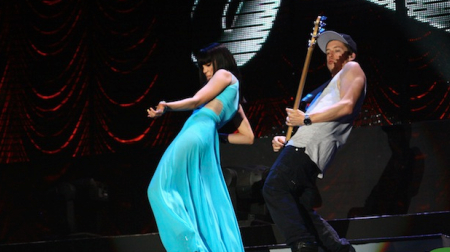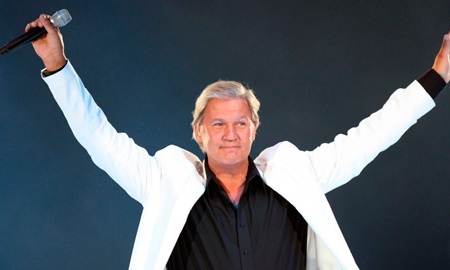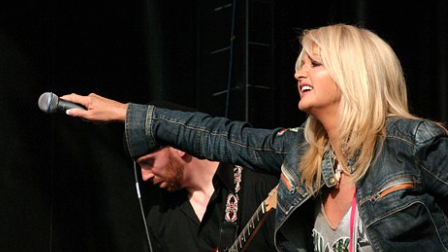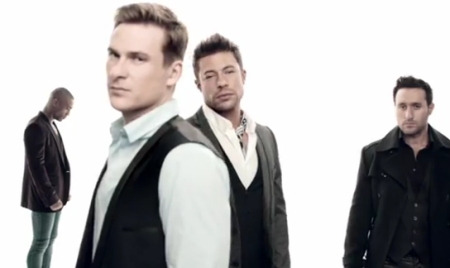Discussions around artists entering the Eurovision Song Contest will include a focus on the career impact an appearance may have. However there has been little analysis about how that impact is assessed. What realistic goals are on offer for performers entering a National Final or Internal Selection process? In particular this article will focus on Prospect Theory and how artists assess the positive and negative returns offered by the Song Contest, how these are affected by the decision making process, and the impact this has on the Song Contest’s musical line-up.
Now that the Super Saturdays and National Finals are here, the quiet reflective period of the Eurovision year is almost over. But the quiet period is a time where you can explore some of the more academic ares of the Eurovision Song Contest. Last year the team at ESC Insight spent time investigating . This year I decided to look at the National Final process. Specifically, who enters a National Final?
Everyone ‘knows’ that it’s a motley crew of has-beens and wannabees, but as we’ve seen before when looking in-depth at academic research, the rules of thumb often held true by fans are not always backed up by evidence. A good case in point here would be how people judge consecutive songs in a running order.
The question for this article is a simple one, but I’ll come to it from a contrary angle. “Why would someone not want to enter the Eurovision Song Contest?“

Looks like Jessie J forgot her G-String (cc Mikhail Teguh Pribadi)
Introducing The Moncrieff Theory
Take this argument from friend of the parish Monty Moncrieff from a discussion of Jessie J and the United Kingdom’s Eurovision entry for 2014. It illustrates the popular fan view on why an artist should submit to the National Final process and enter the Eurovision Song Contest… the Moncrieff Theory of why you should enter Eurovision, if you will (Moncrieff, M., 2014):
Because it will be fun? Because it will give her a lot of publicity? Because she might have accurately deduced that it won’t really matter if she does it and doesn’t do well? Because she’s not falling into the same trap as the broader public in her views about Eurovision? Why wouldn’t she want to do it?
This is a view that fans of the Contest will happily turn out to justify why someone should enter Eurovision – I’m guilty of using it in discussions around the Contest as well. But the fans do not make the decision for an artist. The artist (or the artist, in conversation with their management, record label, and other financially interested parties) makes the decision for themselves and their career.
That decision process is not focussed on the probability of success and positive returns, but on negative returns and the assumption of failure.
The Inherent Risk Of Eurovision
The starting point here is Kahneman and Tversky’s work on Prospect Theory from 1979:
…people underweight outcomes that are merely probable in comparison with outcomes that are obtained with certainty. This tendency, called the certainty effect, contributes to risk aversion in choices involving sure gains and to risk seeking in choices involving sure losses.
What can Prospect Theory tell us about the Eurovision Song Contest? It allows us to look at the ‘risk’ a performer takes when entering the process that could see them represent their country on a world stage, it can help inform us the sort of performer that will enter the Song Contest, and it can help explain why some artists will avoid the Contest.

It’s best not mention ‘Terminal 3’ or ‘Air Force’ around Johnny Logan.
Ultimately every performer who enters Eurovision will lose, apart from the single winner from the Grand Final (and then they have a short window to capitalise on that success). As of January 31st, I’ve been able to confirm 8,427 acts who have submitted a song to a national broadcaster. All of them must dream of taking to the stage in Copenhagen and winning the Contest, and all of them must know that’s an incredibly long shot. Losing at Eurovision is as close to being guaranteed as being a certainty.
Eurovision delivers benefits before that final reckoning, so it is there we must look for the probable outcomes. For many performer, the exposure of a national television broadcast is ‘a good day at the office’. In other words, the National Final appearance and subsequent promotion is one of the key benefits of entering the Eurovision Song Contest.
Eurovision Is A Better Bet Than The Lottery
Let’s start with some numbers to show the sort of levels of risk and reward that a performer has when first approaching the Eurovision Song Contest. For this section, I’m putting aside the broadcasters who will either select the performer and song internally, or where an artist is selected to showcase a number of songs for public selection.
I find it interesting that many papers written around Prospect Theory use a lottery as an example. This makes sense because the outcomes are clear. You buy a ticket (the risk), and your reward will either be a cash prize or nothing (the reward). National Finals have three rewards that are attractive to a performer… to appear on television, to make it through to the final of the National Final, and of course winning the National and heading to the Eurovision Song Contest.
While there is an element of skill and artistic critique involved, let’s look at the National Finals as if they were a lottery. How likely is a performer going to ‘win’ something when they submit a song? At the point of submission there is no indication how many songs you would be compared against, but given the numbers involved from countries in this years seaons (which are broadly similar to the 2013 number), the odds of getting to a televised final are better than buying a winning lottery ticket for most countries.
In the United Kingdom, the overall odds of winning the lowest prize (matching three balls for £25) is one in fifty-six (1.79%).
Compare this to the odds for various National Finals and reaching the televised stages for the 2014 season: Malta received 210 song submissions and has 20 songs in the semi-final (9.52%), Estonia received 189 submissions for 20 spots (10.58%), Finland received 429 entries and has 12 acts in the final stages (2.80%), Iceland is 10 songs from 297 (3.37%).
Two of the extreme results this year belong to Dziesma and Melodifestivalen. The Latvian Contest has a relatively high number of songs appearing in the semi-final with 24 songs, and this year received just 73 submissions. The odds of appearing on television is 32.88%. Meanwhile one of the biggest ‘musical lotteries’ of all in the Eurovision Nationals is Sweden’s Melodifestivalen. While a single act is selected from the Svensktoppen Nästa contest, and another 16 performers are invited to attend by SVT, the submission part of Melodifestivalen is fierce. This year the jury panel selected 15 songs from 2628 submissions, which puts the chance of appearing after a submission at just 0.57%.

Moldova’s Nearly GIrl, Donita Gherman
If we look at every National Final to date that has announced the number of entries, 8,427 performers are known to have made submissions, 243 of them will reach a televised stage (2.88%), and 141 of them will reach a televised final (1.67%).
When It Hurts, It Hurts In The Middle Of The Night
Prospect Theory looks at how people make decisions with the information they have. They look at the evidence to hand, evaluating the outcomes, and then consider how likely they will be to achieve those outcomes. This editing process involves setting a reference point between the ‘good’ and the ‘bad’ outcomes. This neutral point is where the up and down sides are analysed from by the person making the decision.
It takes a significant outcome to actually leave this neutral point. Something big must be on the positive side of the decision that will give enough momentum for the decision to be made. Conversly, the down-side of any decision will have impact on that decision, and Prospect Theory shows that the perceived negative return has far more impact on the process than the positive return, and any negatives are mentally considered as being certain to happen.
The positive return must be far more powerful to overcome the negative return in the mind of those making the decision. The perception of loss is so strong that an outcome that is less than the reference point will hurt far more than the good feeling a gain will deliver.
Take A Chance On Eurovision
When you look at some of the big names that enter the Contest during their peak productive years, it is rarely through the medium of a National Final. Since Italy’s return, RAI have maintained an internal selection process that presumably allows them to negotiate with some of the biggest names in the Italian music scene. Their run of mainstream artists continues in 2014 with Emma Marrone (Escudero, V. M., 2014). The upside that RAI is offering is enough to compensate their artist during the decision-making process, but any broadcaster who elects to use an internal selection removes much of the competitive risk of a National Final, moving the reference point closer to ‘enter’ than ‘be safe and don’t bother’.

To be fair, 23 points was higher than most expected
In previous years, internal selections have allowed big names to have the upside of their decision be ‘appear on the international stage that Eurovision offers’. Željko Joksimović is a good example here, but you can include Anouk, Dino Merlin, and Amaury Vassili in this category. Could you see Engelbert Humperdinck, or Bonnie Tyler, risking an appearance in a mythical UK National Final? (Kennedy 2014, ESC Insight) No. The upside that was needed to attract these artists was the three minutes of global airtime the Song Contest offers.
That said, the majority of the entrants to Eurovision are through competitive selections. While it is not mandated, the EBU have indicated they would prefer national selections to involve the public as much as is practically possible (EBU, Rules of the Eurovision Song Contest, 2014).
A national appearance on mainstream television could be considered a large enough outcome for some performers to apply. In countries with a small music industry, the opportunity for national exposure (and the rising international exposure that the National Finals have online can also be considered) will help outweigh the competitive risk.
For others an appearance is not enough. They need to assess how much damage they think ‘not winning’ a National Final would do to their careers. The majority of names suggessted by fans are those in the public eye, making regular appearances in the charts, with solid album sales and a steady career. A performing artist’s productive time is short. Half of all artists who have a single that charts album will be one-hit wonders and never return, and of the artists that do, they will hang around in the public conscious for around four years at best (Gloor 2011).
A National Final entry during this short window in a career would create huge levels of risk to their current and future income, and as we’ve discussed the perception of risk is magnified through prospect theory. If we return to Moncrieff’s Theorem on entering the Eurovision Song Contest…
Because it will be fun? Because it will give her a lot of publicity? Because she might have accurately deduced that it won’t really matter if she does it and doesn’t do well? Because she’s not falling into the same trap as the broader public in her views about Eurovision? Why wouldn’t she want to do?
…with my own emphasis added. The popular notion of what happens to someone who ‘fails to win’ at the Eurovision Song Contest in many countries (especially in the United Kingdom and Ireland) is that they are labelled as failing. Artists could take some steps to prepare for this, but it’s clear that the fan ideal of ‘it’s the taking part that counts’ does not come into the decision making process. The idea of not doing well, magnified in the decision making process by the near certainty of not winning the Contest, cannot be countered by the mentally minimised positive benefits. That is enough to stop the mainstream artist entering the National Final process or submitting to a potential Internal Selection.
What This Means For The Music At The Song Contest
With some notable exceptions (be it a broadcaster who sweetens the pill or a sense of patriotic duty) the Eurovision Song Contest is never going to attract a performer from the current in-crowd of artists. These artists are in the golden years of their career. There is simply too much percieved risk at the point where the performers make the decision to enter or not, and there is not enough value in the upside compared to their current circumstances. Risk-averse performers will not enter the Song Contest
The Contest will continue to attract the risk-takers in the music industry. The bulletproof young bands with something to prove do not need to have a huge reward to balance out the risk of entering – getting on TV, making it to a National Final, these are all entries on a career CV that will stand them in good stead as they mature. On the other side of the hill, there are artists who want to return to the limelight. The risks for them are higher, but tempered by the feeling that it is worth taking a chance, especially in light of the volume of press that an appearance at the Contest can generate. The upside, while still a long shot, has far more value to them in the twilight of their career.

Blue came back to go all-in, arguably the gamble failed.
Risk Is Eurovision’s Business
The Eurovision Song Contest will continue to attract the performers at the begining and the end of their repsective careers.
While it may be the biggest musical stage on Earth, the most watched singing contest in the world, and one of the few international events in the current media landscape which promottes participation by the public, the competitive nature of the event will ensure that it will rarely reflect the Top 40 stars of the day.
And I’m okay with that. Listen to the Top 40 singles and albums on any given Sunday and you will find lots of safe music. It all sounds roughly the same, a playlist of popcorn, audio wallpaper paired up with just enough storytelling so you’ll buy the latest album from the record company’s favourite singer that week – are there still Taylor Swift fans who haven’t bought a copy of ‘Red’ yet?
That’s not the Eurovision I know or recognise. I look at the Song Contest and I see real emotion. I see young bands looking for their big break and a chance to be noticed around the world. I see some of the biggest names in music from around Europe ready to wrap themselves in a flag and have one last hurrah as the centre of attention. I see broadcasters showcasing a wide range of musical genres, from ska and opera, through dub-step and folk, to a cappella and jazz (maybe we’ll get some deep-house to go with the schlager this year).
I like my music like I like life. Willing to take risks, willing to stand up and be counted, willing to stay away from the safe and easy decision, and ready to make every moment worth living for. Without the risk we may have more appearances from the Jessie Js, Daft Punks, and One Directions, of the modern music labels. But without the risk it would no longer be the Eurovision Song Contest that we all know and love.
References
Moncrieff, M, 2014. Two people flagging this up now, so let’s get… Facebook [online]. 17 January 2014. Available from https://www.facebook.com/montichka/posts/10151827082001143 [Acccesed 17 February 12014].
Kahneman, D. and Tversky, A. 1979. Prospect Theory: An Analysis of Decision under Risk. Econometrica, 47(2), pp. 263-291, March 1979.
Rules of the Eurovision Song Contest (Public Version) [online]. EBU, 2014. Available https://www.eurovision.tv/upload/press-downloads/2014/Rules/EurovisionSongContest_2014_Rules_Public_ENG_20.09.2013.pdf [Accessed 13 February 2014].
Gloor, S, 2011. How changes in music industry affect the length of an artist’s career [online]. MEIEA Journal, 2011.
Escudero, V. M., 2014 Emma to represent Italy in Copenhagen [online]. Eurovision.tv. Available from https://www.eurovision.tv/page/news?id=emma_to_represent_italy_in_copenhagen [Accessed 22 January 2014].
O’Conner, J. K., 2014. Let Me Be The One: Looking Back At The UK National Finals [online]. ESC Insight. Available from https://escinsight.com/2014/01/24/let-me-be-the-one-looking-back-at-the-uk-national-finals/ [Accessed 13 February 2014].









So far so good. Now for a selection process that diminishes the probability of choosing the Top-40-est option available regardless.
Your point about the percentage chance of appearing in the national final is more or less irrelevant for a truly known artist, as in the vast majority of cases they’ll be selected by the organiser for the shortlist regardless of their song quality
Keley, a fair point – it’s why the Melodifestivalen numbers are 15 and not 31, why the two strands of the German NF are split up in the chart, and a few other areas. The point in general (that treating it as truly random) is noted in the article. Of course bigger names have abetter chance, but their perceived downside of not appearing or not winning is greater, and actually carriers more mental weighting than the increased selection chance.
ESC is not ESC with juries, it’s a huge bad joke and a disrespectful mockery of the original idea.